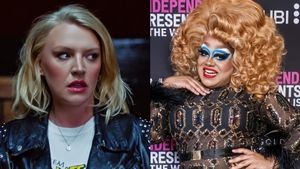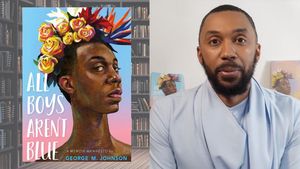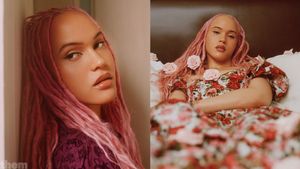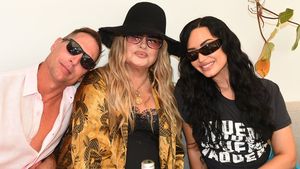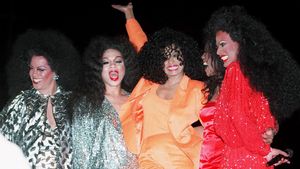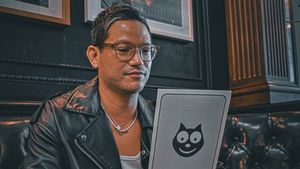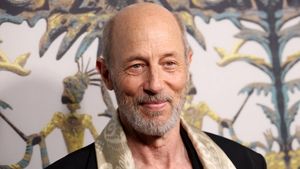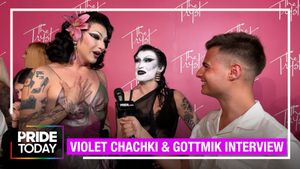As the saying goes, “You can’t really understand another person’s experience until you’ve walked a mile in their shoes.” But if you want to understand Leiomy Maldonado’s experience, Mary, you’re going to have to do a whole lot more than walk in her shoes. If you want to understand the ballroom icon, you’re going to need to duckwalk, dip, and Leiomy Lolly in her shoes — and now you almost can. At least you can get a much better idea of what it looks like to be Leiomy on the dance floor with Meta’s “It’s Your World” campaign, in which it, Leiomy, and EssilorLuxottica have teamed up to offer a glimpse at the world through the iconic dancer’s eyes with the Ray-Ban Meta Smart Glasses.

Fred Daniels III
For those unfamiliar with these techy specs, they look like the classic Ray-Ban Wayfarer sunglasses, but house cameras, speakers, and AI tech. They allow you to capture the world in pictures and video just as you see it, as well as livestream from the glasses to Facebook and Instagram. They’re controlled both at the touch of a button or through the conversational assistant, which is activated with the phrase “Hey Meta.”

Courtesy of Ray-Ban
While it certainly makes sense as a fan of Leiomy to want to see what she sees, the question is: What was it about this collaboration and partnership that made her want to use her carefully guarded platform to elevate them? “Anytime I work with any brands or anything involving campaigns, I always want to make sure that is true to who I am. I never want to feel like I need to be filtered or feel like I need to have a script. I’m not a script girl,” she tells PRIDE. “When I found out about the Meta Ray-Ban smart glasses I was so intrigued because I’m a dancer, I love to create content, and I’m a tech head as well.”
It also helped that she had previously worked with Meta on the “Dream House’’ in Horizon Worlds, which was created to offer a safe space in the Metaverse to LGBTQ+ folks. “It’s not like I have to come in here and like, put up a front of who I am or who I want them to be. They just love who I am,” she explains.
That the tech offers the ability for people everywhere to empathize and see the world through her eyes was not lost on the trans rights activist. “As a person of trans experience, when we go out into the world, people don’t know what we go through. A lot of people think that we transition to be like, ‘Oh, we’re beautiful’ when we’re actually dealing with so many different things in life,” she says. “They don’t often believe our struggle. They don’t believe the things that we go through as trans, being a part of the LGBT community, or just showing up different to the world.”

Fred Daniels III
She points out how the smart glasses can be a tool of activism as well, allowing the wearer to document the world with the touch of a button and without being conspicuous by pulling out a phone. “I can just press this record and not have to deal with someone seeing me recording on my phone; There are people who want to record but imagine being seen recording and then now the attention turns on you. And now you’re being harassed and attacked because you just wanted to be a civilian that wanted to get something on film,” she says, adding that documentation is especially important in the queer and trans communities, which face harassment but whose members’ lives are also at risk.

Fred Daniels III
The glasses are also a tool for documenting queer and trans joy — and in Leiomy’s hands (and on her face), ballroom culture. “Experiencing a real-life ‘get ready with me’ through ballroom eyes alone will be so groundbreaking because I honestly feel like people see ballroom and think, ‘maybe that person has a team, they’re celebrities. But a lot of times we’re creating their own effects,” she shares. “They’re Googling and researching to teach themselves how to create things. So to me, it’s a very different way to explore the ballroom.”
But more exposure also means a greater risk of cultural appropriation, and Leiomy is very protective of the culture. “Ballroom is not a party. It’s a culture. Just like every other culture, it should always be respected,” she says. And when it’s not respected, she’s not afraid to speak out against the “culture vultures.”

Fred Daniels III
“I like to use my platform to bring awareness to things, even though it may piss other people off,” she explains. “I’m not here for that. I’m not here to fill up cups. I’m just here to make sure shit is right. I don’t care if I lose followers. I don’t care if people feel like they dislike me, because I’m being very stern about the respectful ballroom and the respect for voguing, and for people to understand that it’s not a joke. It can be a kiki, but it’s not a joke.”
Appropriators can kick rocks; appreciators, however, are more than welcome to truly see what it’s like to view the world of ballroom through a living legend’s eyes.






















































































